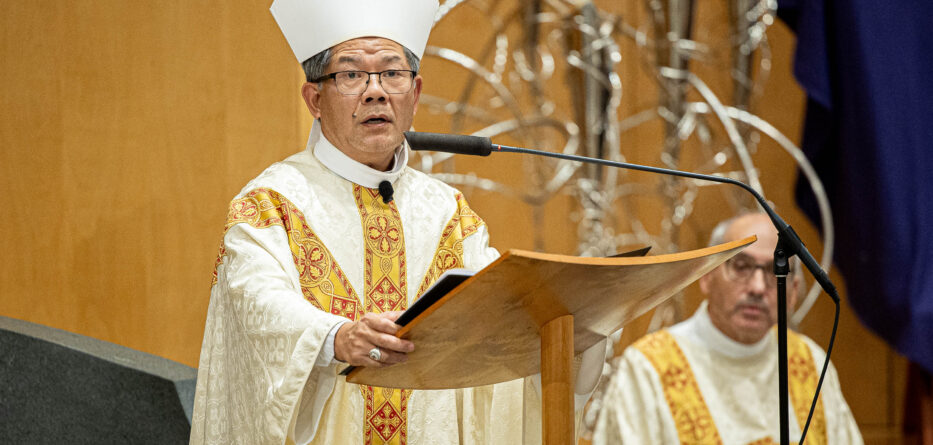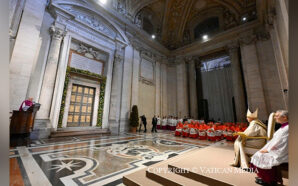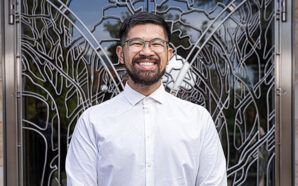Most Reverend Vincent Long Van Nguyen OFM Conv DD STL, Bishop of Parramatta
Homily for the Fifth Sunday of Easter, Year B and Admission to Diaconal Candidacy of Charles Hyson
Readings: Acts 9:26-31; 1 John 3:18-24; John 15:1-8
28 April 2024
Channelling the vine of God’s life and love to others
Dear friends in Christ,
We live in a time of heightened tension, conflict and violence. The war in the Holy Land brings this reality home to us as demonstrations regularly take place in the streets of our big cities. The world is not at peace with itself. But even when we are not living in a war zone, we still have a lot of work to do in terms of creating a society in which we are in right relationship with each other.
These last few days, we also hear tragic stories of people who are victims of domestic violence. One woman is violently killed every four days. This is our national shame. Those who come to Australia fleeing persecution and violence in their homeland are often subjected to long periods of detention and suffer irreparable damage as a result. The current cost of living crisis makes life a struggle for so many people, especially those who have to make ends meet or those who are on the margins.
In the face of all these struggles that we all live with, individually and collectively, our default response is to retreat into a kind of self-interest, individualism or nationalism. However, as followers of Christ and catalysts for the kingdom of God that he inaugurated, we are called to respond in faith and hope. We cannot be paralysed by what Saint Pope John Paul II called the “supposed impossibility of changing the world”, because the power of Christ’s resurrection spurs us on.
Today’s Word of God strengthens us in our resolve to transform the world according to the Christian mandate. The God who summons us to act as catalysts of his kingdom also accompanies us on path of suffering, death and resurrection. Therefore, we can go forward with courage and faith trusting that God will bring about new life out of our barrenness.
The first reading tells us how incredibly generous, courageous, outward-looking and even boundary-breaking the early Church was. Earlier episodes focus on their internal cohesion in the face of external pressure and persecution. In today’s account, we are told of a watershed moment. They were no longer a Jewish sect. They had done something quite momentous. Paul and Barnabas were the first missionaries who had gone beyond the geographical and racial confines of their known world. They shared the Good News with the Gentiles and even made them equal members within their group.
In the Gospel, Jesus describes himself as the true vine. In contrast to the ravaged and unfruitful vine of Israel that the prophets denounce, he bears the fruits that God the owner seeks. That is because unlike Israel’s unfaithfulness, Jesus is united with the Father. His disciples will likewise bear fruit if they are united with him as the branches to the vine. It is our union in Christ that enables us to draw life from him and pass it on to others. We need to be grafted onto Christ as well as to be knit together in love, to grow strong, to be stable and to be able to stand as people of faith. In Jesus who is the nucleus of the new Israel, God has established the Church in which we are to grow, to bear fruit and to channel God’s life and love to the world. It is by imitating Christ’s self-emptying love that we can be true to our mission of sharing God’s life and love for the world.
Brothers and sisters,
Today, we induct our brother Charles into the formal journey towards diaconal ministry. Candidacy is a commitment to self-sacrifice, humble service and servant leadership. It is to follow the example of Christ who came not to be served but to serve. In post-Royal Commission Australia, the mystique and social stature of the ordained have all but disappeared. Pope Francis has appealed to the shepherds to wear the smell of the sheep and to abandon the culture of comfort, security and self-protection in order to go out to the periphery.
So much of what has gone wrong in the Church stems from the preoccupation with power, control and prestige instead of love, humility and service. I am convinced that if Christian ministry has a better future, it has to find expression in better mutual support, collaboration and partnership. The spouses are, therefore, integral to your formation and eventually your diaconal vocation. We celibate clergy have a lot to learn from you as you seek to embody the ideal of Christian service not only in how you minister but also in how you nurture relationships starting from the family.
“Every branch in me that bears no fruit, my Father cuts away, and every branch that does bear fruit, he prunes to make it bear even more.” The Church as a whole needs pruning as indeed it is undergoing. The season of pruning may be unsettling but the future belongs to God and we must not lose heart as we act in favour of that future. Let us pray that our lives are rooted and grounded in our communion with God and with one another. Let our unwavering faith, undivided loyalty and unconditional trust help us to become authentic followers of Christ. May our union with him nourish and strengthen us in our mission of channelling the vine of God’s life and love to our brothers and sisters.








